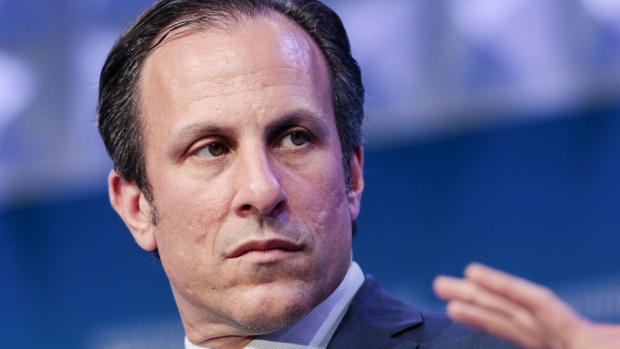Feb 20, 2020
Lippmann’s LibreMax Takes ESG Mission to Skeptical CLO Market
, Bloomberg News

(Bloomberg) -- ESG has a new champion in one of the most opaque and skeptical corners of capital markets: The firm run by Big Short protagonist Greg Lippmann.
The collateralized-loan obligations arm of LibreMax Capital LLC could make ESG the linchpin of its securitization business after it completes its first deal complying with the category, according to David Moffitt, the firm’s head of tactical opportunity investing and CLO management.
“In the future it could be that more of our CLOs than not will be ESG-compliant,” Moffitt said in an interview. That “could be a differentiator between us and other firms.”
CLOs are pools of loans to highly indebted companies that are repackaged into bonds. Investors worried about the carbon footprint of those end-borrowers, for example, could find reassurance in the move by LibreMax, which is run by the trader who famously shorted subprime mortgages before the financial crisis.
The deal will be sold by Trimaran Advisors LLC, the CLO firm LibreMax bought in November 2018.
Opaque borrowers of leveraged loans including private-equity firms have been slow to take up the ESG guidelines embraced by public issuers.
Sellers of leveraged loans only selectively disclose financial information; in the past they’ve even asserted control over who buys their debt through blacklists in the U.S and so-called white lists in Europe. The lack of accepted ESG standards and loans that meet the criteria has been cited as another obstacle holding back this kind of securitization.
Earlier this month the main trade body for the $1.2 trillion industry in the U.S. developed an ESG survey that companies can fill out when seeking financing, though it will be voluntary and they won’t need to keep the disclosure up to date.
Read more: Leveraged Loan Market’s ESG Push Offers Window Into Opaque Deals
Jonathan Butler, head of European leveraged finance at PGIM Fixed Income, says it’s just a matter of time before the market joins the ESG boom.
“Scrutiny is building and I feel like leveraged finance is quickly catching up with other parts of the market,” said Butler, whose team uses its own ESG rating system to pick investments.
Sin Bucket
The leveraged loans in LibreMax’s CLO will come from companies that derive 50% or more of their revenue from ESG-compliant industries. Excluded will be borrowers that get the bulk of earnings from oil and gas extraction, trading in protected wildlife and gambling. Loan issuers will also be screened for governance best practices, including diversity of board members.
“Issuers can include clean energy, renewables and certain technology industries,” Moffitt said. “Obviously we stay away from sin-bucket assets.”
The new CLO via Credit Suisse Group AG will join a handful of others with the ESG stamp. MJX Venture Management III LLC and Partners Group have issued CLOs with explicit ESG investment restrictions in the U.S., according to Moody’s Investors Service.
In Europe, NIBC Bank and Permira Debt Managers are among the sellers of ESG compliant CLOs since 2018, according to data compiled by Bloomberg.
“You can put almost any asset in a CLO and ESG is just another asset flavor that can go into these structures,” Moffitt said.
--With assistance from Laura Benitez, Alastair Marsh and James Crombie.
To contact the reporter on this story: Cecile Gutscher in London at cgutscher@bloomberg.net
To contact the editors responsible for this story: Sam Potter at spotter33@bloomberg.net, ;Vivianne Rodrigues at vrodrigues3@bloomberg.net, Chris Vellacott, Sid Verma
©2020 Bloomberg L.P.


